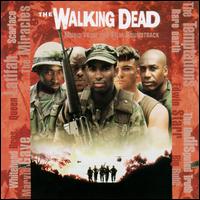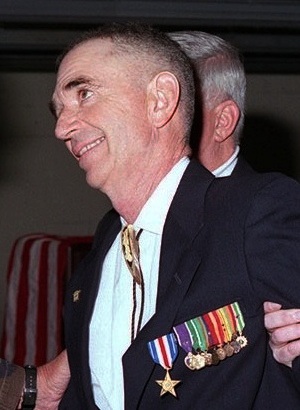
Carlos Norman Hathcock II was a United States Marine Corps (USMC) sniper with a service record of 93 confirmed kills. Hathcock's record and the extraordinary details of the missions he undertook made him a legend in the U.S. Marine Corps. He was honored by having a rifle named after him: a variant of the M21 dubbed the Springfield Armory M25 White Feather, for the nickname "White Feather" given to Hathcock by the North Vietnamese People's Army of Vietnam (PAVN).

The Battle of Ia Drang was the first major battle between the United States Army and the People's Army of Vietnam (PAVN), as part of the Pleiku Campaign conducted early in the Vietnam War, at the eastern foot of the Chu Pong Massif in the central highlands of Vietnam, in 1965. It is notable for being the first large scale helicopter air assault and also the first use of Boeing B-52 Stratofortress strategic bombers in a tactical support role. Ia Drang set the blueprint for the Vietnam War with the Americans relying on air mobility, artillery fire and close air support, while the PAVN neutralized that firepower by quickly engaging American forces at very close range.

We Were Soldiers is a 2002 American war film written and directed by Randall Wallace and starring Mel Gibson. Based on the book We Were Soldiers Once… and Young (1992) by Lieutenant General (Ret.) Hal Moore and reporter Joseph L. Galloway, it dramatizes the Battle of Ia Drang on November 14, 1965.

The Green Berets is a 1968 American war film directed by John Wayne and Ray Kellogg, and starring Wayne, David Janssen and Jim Hutton, based on the 1965 novel by Robin Moore. Much of the film was shot in the summer of 1967. Parts of the screenplay bear little relation to the novel, although the portion in which a woman seduces a North Vietnamese communist general and sets him up to be kidnapped by Americans is from the book.

Estimates of casualties of the Vietnam War vary widely. Estimates can include both civilian and military deaths in North and South Vietnam, Laos, and Cambodia.
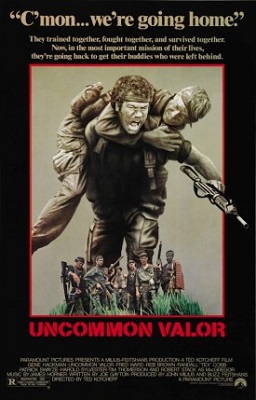
Uncommon Valor is a 1983 American action war film directed by Ted Kotcheff and starring Gene Hackman, Fred Ward, Reb Brown, Randall "Tex" Cobb, Robert Stack, Patrick Swayze, Harold Sylvester and Tim Thomerson. Hackman plays a former U.S. Marine colonel who puts together a rag-tag team to rescue his son, who he believes is among those still held in Laos after the Vietnam War.
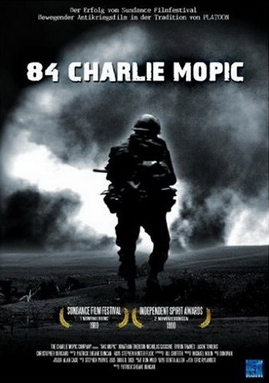
84C MoPic is a 1989 American independent found footage war drama film written and directed by Patrick Sheane Duncan.
Robert Russell Garwood is a former United States Marine. Often cited as the last verified American prisoner of war (POW) from the Vietnam War, Garwood was captured on September 28, 1965 by Việt Cộng forces near Da Nang, Quang Nam Province. He was taken to North Vietnam in 1969, and although he was reportedly released in 1973 along with the other U.S. POWs as part of the Paris Peace Accords, he did not return to the United States until March 22, 1979.

The 1st Battalion 9th Marines (1/9) was an infantry battalion of the United States Marine Corps. Formed during World War I, it served until the mid-2000s when it was deactivated to make room for one of three light armor reconnaissance battalions. During the Vietnam War, 1/9 sustained an especially high casualty rate, such that it received the nickname "The Walking Dead".

Robert Emmett O'Malley is a United States Marine veteran who was the first Marine Corps recipient of the Medal of Honor in the Vietnam War. He received the medal for his actions as a corporal on August 18, 1965, during Operation Starlite.

Walter Keith Singleton was a United States Marine Corps sergeant who was awarded the Medal of Honor posthumously by President Lyndon B. Johnson, for his actions above and beyond the call of duty in Vietnam on March 24, 1967, during the Vietnam War.
The Battle of A Shau was waged in early 1966 during the Vietnam War between the People's Army of Vietnam (PAVN) and the forces of the United States and South Vietnam. The battle began on March 9 and lasted until March 10 with the fall of the U.S. Army's Special Forces camp of the same name. The battle was a strategic victory for the PAVN in that they were able to take control of the A Shau Valley and use it as a base area for the rest of the war.

The Phantom Blooper: A Novel of Vietnam is a 1990 novel written by Gustav Hasford and the sequel to The Short-Timers (1979). It continues to follow James T. "Joker" Davis through his Vietnam odyssey. The book was supposed to be the second of a "Vietnam Trilogy", but Hasford died before writing the third installment.

The Battle of Kham Duc was a major battle of the Vietnam War. The event occurred in Khâm Đức, now district capital of Khâm Đức District, then in Quảng Tín Province, from 10–12 May 1968. During the Tet Offensive of 1968, the People's Army of Vietnam (PAVN) 2nd Division tried to capture Đà Nẵng, but they were defeated in the Battle of Lo Giang by elements of the U.S. 1st Marine Division and the 23rd Infantry Division. PAVN General Chu Huy Mân disengaged from the fight on the outskirts of the city, and pulled the 2nd Division into the mountains to rest, rebuild, and prepare for the next major operation. The US and allied defenders of the Special Forces camp at Khâm Đức, a small district in the north of Quảng Tín, were chosen as the next target for the 2nd Division. Although the Special Forces camp had never been an obstacle to the constant infiltration of PAVN troops around it, the North Vietnamese hoped to attract major US reinforcements away from the lowland populated areas, kill or capture them and film the battle, presumably to make it look like a US Điện Biên Phủ on the eve of the 1st Paris peace conference.

Operation Buffalo was an operation of the Vietnam War that took place in the southern half of the Demilitarized Zone, around Con Thien.
After the 1978 Vietnamese invasion of Cambodia and subsequent collapse of Democratic Kampuchea in 1979, the Khmer Rouge fled to the border regions of Thailand, and, with assistance from China, Pol Pot's troops managed to regroup and reorganize in forested and mountainous zones on the Thai-Cambodian border. During the 1980s and early 1990s Khmer Rouge forces operated from inside refugee camps in Thailand, in an attempt to de-stabilize the pro-Hanoi People's Republic of Kampuchea's government, which Thailand refused to recognise. Thailand and Vietnam faced off across the Thai-Cambodian border with frequent Vietnamese incursions and shellings into Thai territory throughout the 1980s in pursuit of Cambodian guerrillas who kept attacking Vietnamese occupation forces.
Operation Medina was a search and destroy operation conducted from 11 to 20 October 1967 in the Hải Lăng Forest Reserve south of Quảng Trị, South Vietnam.
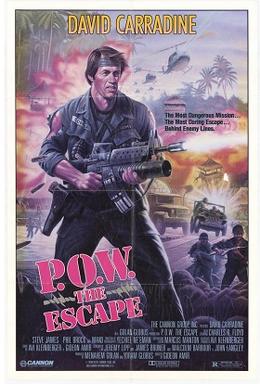
Behind Enemy Lines is a 1986 American action film directed by Gideon Amir and starring David Carradine. It is set in the context of the Vietnam War POW/MIA issue where Colonel Cooper, an Airborne commando, is sent to Vietnam to free American soldiers caught in a Vietnamese prisoner of war camp.
Company E, 52nd Infantry, (LRP) was a 120 man-sized long-range reconnaissance patrol unit attached to the 1st Cavalry Division (Airmobile) in Vietnam in 1967-69. Its origin begins on January 1, 1967, as "LRRP Detachment G2," 1st Cavalry Division (Airmobile). It was then redesignated "Headquarters & Headquarters Company LRRP Detachment" in April 1967, and redesignated "Company E, 52nd Infantry (LRP)" on December 20, 1967.

Sharon Ann Lane was a United States Army nurse and the only American servicewoman killed as a direct result of enemy fire in the Vietnam War. The Army posthumously awarded Lane the Bronze Star Medal for heroism on June 8, 1969.
